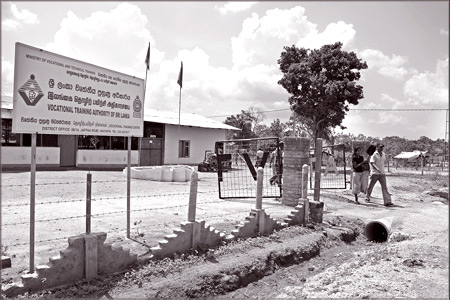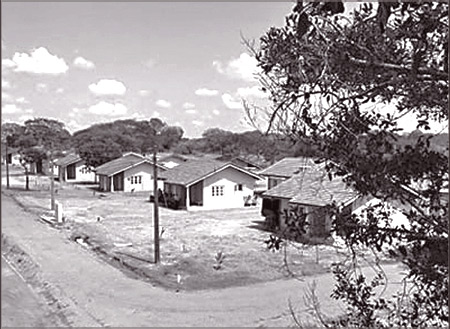Philosophy of resettlement and economic development
Prof. Rajiva Wijesinha, MP
One of the greatest barriers to Reconciliation, I fear, is the
difficulties government has to make its position clear. This springs in
part from the systemic failure that will soon overwhelm us if remedial
action is not taken swiftly. As it is, I believe we continue to survive
only because of the enormous energy of a few, and the general decency of
many of our administrators, whom the system however tends to suppress,
with no efforts to institutionalize procedures and reporting mechanisms.

Vocational Training Centre in Vavuniya. File photo |

Housing facilities for resettled people in Manik Farm and Sampur.
File photo |
Symptomatic of this is the confusion about the guidelines that are
issued to Grama Niladharis, the lowest rung of the ladder in the public
service, but arguably the most important, for they are the interface
between government and the public. Strengthening their administrative
capacity would go far towards overcoming many problems government now
faces, with more senior decision makers plagued by problems that could
so easily - and with much less inconvenience to all concerned, including
travel time and money - have been resolved or lower down.
Resettlement programme
When I first realized the wide differences between Grama Niladharis
in terms not just of efficiency, but also with regard to understanding
of their roles, I asked what instructions were given to them when they
were appointed.
I was presented then with a Diary, which had in its initial pages a
list of responsibilities which seemed to me a regurgitation of what they
had been expected to do in the times of the colonial administration. I
trust I am wrong, and that amendments have been made over the years, but
in general it is clear that a thorough overhaul is essential, not just
tinkering. In particular, the ethos should be one of local consultation,
with mandatory provisions for this - on the lines of the advisory bodies
envisaged in the original Mahinda Chintanaya - rather than the top-down
approach that was appropriate for a colonial power co-opting local
agents whose responsibilities were to the governors, not the governed.
Some efforts at clarification, if not reform, were made under a
recent UNDP project.
This has resulted in a Handbook, which suggests modes of operation
and responsibilities, and provides guidelines with regard to the various
responsibilities conferred through the document in the Diary.
However I found this document is not well known in the North. I was
fortunate enough to see a copy only after I began reconciliation work in
the East, but further inquiries elsewhere drew a blank. I had earlier
gathered that, in the familiarization sessions conducted by the Ministry
for new Grama Niladharis, there were no written instructions given save
for the Diary.
Though I may not have understood the whole story, I fear that others
in authority are equally unfamiliar with the Handbook.
Leaving aside this omission - and I remember telling UNDP many years
ago that they really had to do better on their Good Governance programme
to ensure sustainable results - I have also been disappointed at the
relative lack of understanding amongst Grama Niladharis about the role
of government, and in particular the strategies adopted for the
resettlement programme. In many places the complaint is that government
has not provided the displaced with permanent housing. This shows a
fundamental ignorance of the principle that government adopted, namely
that it would provide basic shelter for all when they went back, but
that building up houses was not the responsibility of government. While
there have been several initiatives to provide housing, for instance by
the Army and some NGOs and the Indian government, these are intended for
the worst off and the most vulnerable.
With regard to the rest, government ploughed in massive resources to
expedite productive employment.
Vocational training
The tremendous achievements with regard to infrastructure, for which
an expensive demining programme had first to be implemented, were
designed to promote livelihoods, in particular agriculture and fishing.
This has succeeded, and should lead to beneficiaries improving their own
situations, without waiting for handouts.
Unfortunately this philosophy has not been explained so, in
characteristic Sri Lankan mode, individuals see others getting benefits
and expect that they too should receive them as a right.
Instead of coping with endless complaints about not having got
houses, government should instead encourage the resettled to request
better training for more productive livelihoods. In some places I have
had suggestions that there should be more targeted vocational training,
and the development of skills in marketing and value addition for
harvests from land and sea, but there could be much more focus on this
to accompany the basic productivity that has been achieved. Similarly,
villagers should be encouraged to put forward proposals for better
irrigation and storage facilities, to parallel what seem coordinated
efforts in this regard in the East.
True, the Eastern Province government, and the massive input by
central government, operated in a less contentious time and place to
establish the foundations of what now seems astonishing prosperity,
compared with what I remember from a few years back. But similar
achievements are possible in the North, if government uses all
administrative tools at its disposal to make clear its plans and involve
the people in putting forward proposals and working within that
framework. For this purpose, active consultation in a structured manner
would be invaluable, and this should be done at Grama Niladhari Level.
A couple of months back I sent some suggestions for the type of
meetings that should be held regularly. Though of course these can be
fine tuned, I believe we are wasting an excellent resource if we do not
entrench consultations on the following lines in all Grama Niladhari
Divisions, with obligations to report problems and advance suggestions
to the next level up, the Divisional Secretariat.
Suggestions for mandatory Meetings on a weekly basis in Grama
Niladhari Divisions
a) Livelihood and development: This should involve Rural Development
Societies and Womenís Rural Development Societies as well as youth
groups. Rural Development Officers should attend and representatives
from the Ministry of Economic Development should be invited along with
Agriculture Extension Officers and others working in relevant areas. Aid
organizations contributing to livelihood development should be invited,
in particular representatives of the UN Development Agencies and IOM.
Issues discussed should include infrastructural development,
technical support, training needs and micro-credit provision. Government
officials should make clear what has been provided and future plans
whilst encouraging prioritization of requests. The focus should be on
ensuring that support is directed towards ensuring the economic
empowerment of the population rather then perpetuating dependency.
b) Protection: This should involve Womenís Societies and the Police,
with the particular involvement of Womenís and Childrenís Desks (which
should be established in at least every DS Division). Officials involved
in social services should be invited, and the DS should assign at least
one such official (from Health, Probation, Women and Childrenís Ministry
and Organizations, Social Services, Counselling) to each GN Division.
Schools should be represented and should provide schedules of dropouts
and possible problem cases. Religious personnel should be asked to
participate and contribute to support groups actively. Aid organizations
contributing to protection should be invited and should share the impact
of their work with government so as to fine tune and develop it. UNICEF
and UNFPA should be invited on occasion.
Issues discussed should include the provision of adequate awareness
raising programmes, at schools and elsewhere, with particular attention
to alcohol, drugs and sexual issues. The creation of support groups, for
counselling as well as protection, should be considered, with the
meeting taking cognizance of those in vulnerable situations. The
meetings should lead to closer cooperation with the Police, leading to
swift redress in cases of criminal activity, but also advice and warning
when dangers are anticipated. Particular attention should be paid to
former combatants to promote their active integration into community
life.
c) Social and cultural activities: This should involve education as
well as cultural officials. Youth and Sports Groups and the Police and
Civil Affairs officers from the Army may also be invited.
Issues discussed should include the provision of extra-curricular
activities in schools and ensuring that education is comprehensive and
not confined just to academic learning. Sports and cultural activities
should be provided in all schools along with societies contributing to
socialization such as Boy Scouts and Girl guides, Cadeting, St Johnís
Ambulance Brigades and Interact and other similar clubs.
The GN Division should also promote voluntary language development
classes, with the Police and the forces contributing to Sinhala
conversation classes whilst also learning conversational Tamil
themselves. It should also promote entertainment including regular
performances at Divisional Cultural Centres (using school buildings
where separate Centres are not available), the development of Public
Libraries, and regular film shows, with organizational input from
students. |



